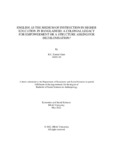| dc.contributor.advisor | Huq, Samia | |
| dc.contributor.author | Alam, K.C. Zamiul | |
| dc.date.accessioned | 2022-11-22T06:44:23Z | |
| dc.date.available | 2022-11-22T06:44:23Z | |
| dc.date.copyright | 2022 | |
| dc.date.issued | 2022-05 | |
| dc.identifier.other | ID: 16101143 | |
| dc.identifier.uri | http://hdl.handle.net/10361/17607 | |
| dc.description | This thesis is submitted in partial fulfillment of the requirements for the degree of Bachelor of Social Science in Anthropology, 2022. | en_US |
| dc.description | Cataloged from PDF version of thesis. | |
| dc.description | Includes bibliographical references (pages 26-29). | |
| dc.description.abstract | The only acceptable medium of Education in the public and private universities of Bangladesh
is English. Though most of the undergrad students come from the Bangla Medium background,
they are expected to use English in all sorts of written and verbal communication. Due to this
sudden shift to a medium of foreign language, they get silenced in the classroom due to their
linguistic capital. On the other hand, because of English, the students from the English Medium
background accumulate greater symbolic capital and stand in a superior academic position.
Keeping this class nature in mind, the core objective of this study is to find out why does a
foreign language persists as the only acceptable MOI. With the help of responses from
undergrad students and inspirations from the theoretical frameworks of Dr. Mohammad Azam
Dr. Salimullah Khan, Dr. Shaila Sultana, Frantz Fanon, Ngugi Wo Thiong’o, this study
analyzes the merits and demerits of EMI by taking class conflict, the role and function of
language, symbolic capital associated with English and the outputs of EMI into consideration.
Finally, it indicates that the persistence of EMI is owing more to the colonial history rather than
to the promised practical benefits and asks for decolonisation. Postcolonialism, decolonisation,
language and language planning in education are the fields this study deals with and creates a
conversation about. | en_US |
| dc.description.statementofresponsibility | K.C. Zamiul Alam | |
| dc.format.extent | 43 Pages | |
| dc.language.iso | en_US | en_US |
| dc.publisher | Brac University | en_US |
| dc.rights | Brac University theses are protected by copyright. They may be viewed from this source for any purpose, but reproduction or distribution in any format is prohibited without written permission. | |
| dc.subject | Colonialism | en_US |
| dc.subject | Post Colonialism | en_US |
| dc.subject | Decolonisation | en_US |
| dc.subject | Medium of Instruction | en_US |
| dc.subject | Education | en_US |
| dc.subject | English | en_US |
| dc.subject.lcsh | Language and languages--Study and teaching | |
| dc.subject.lcsh | Postcolonialism--Commonwealth countries--Congresses. | |
| dc.title | English as the medium of instruction in higher education in Bangladesh: A colonial legacy for empowerment or a structure asking for decolonisation? | en_US |
| dc.type | Thesis | en_US |
| dc.contributor.department | Department of Economics and Social Sciences, Brac University | |
| dc.description.degree | BSS in Anthropology | |

